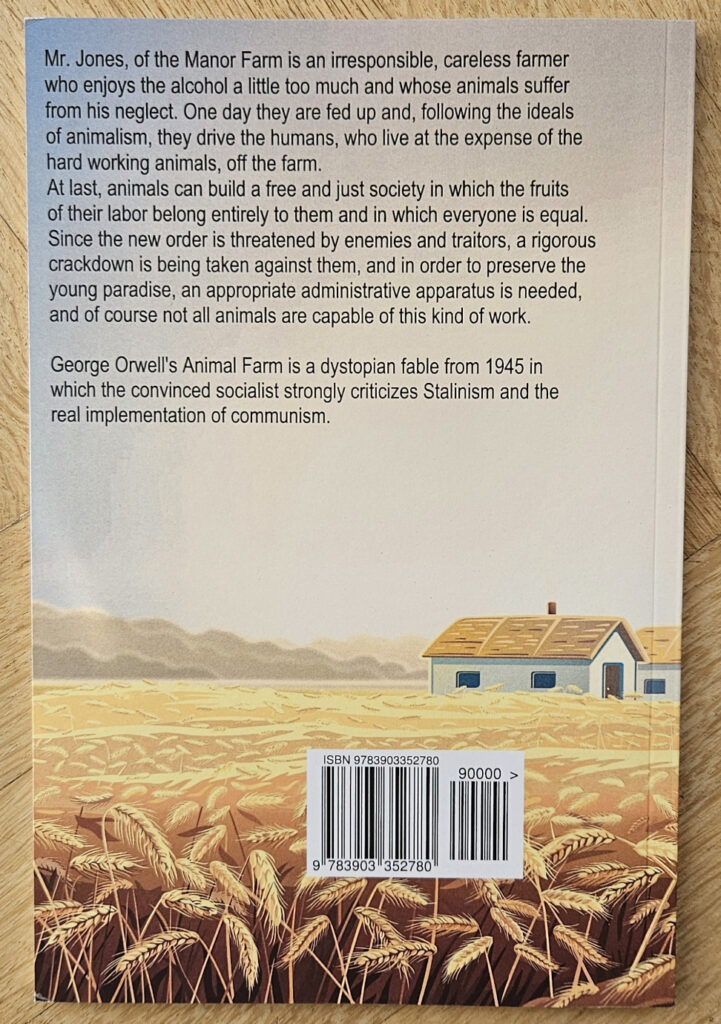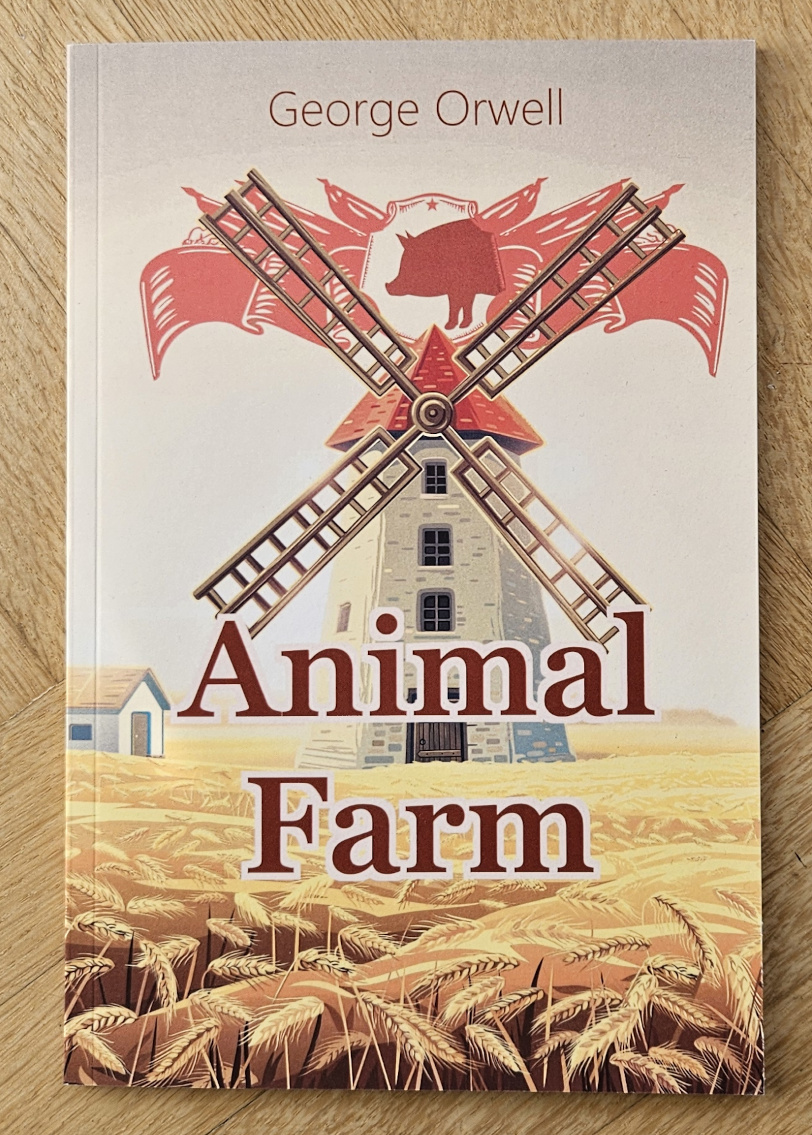There is one sentence in George Orwell’s classic “Animal Farm” that summarizes human behaviour and human life: ‘ALL ANIMALS ARE EQUAL, BUT SOME ANIMALS ARE MORE EQUAL THAN OTHERS’.
The book, published by Eric Arthur Blair under his pen name George Orwell in 1945, turned an instant success. George Orwell was born in 1903 in British India and moved between Great Britian and South East Asia quite often during his life. He worked as teacher, did a tour in Burma for the British colonial police, was a volunteer in the Spanish Civil War – but mostly he wrote. He was a journalist and essayist all his life. Not only print, but also some radio work. During his life, money seems never have been an obstacle, as he did not need much. The big success of his books “Animal Farm” and “1984” came only in 1945-1949, during the last 5 years of his life. He died young, with only 47 years of age, in London as victim of an ill-cured tuberculosis. Not much chance to really enjoy his fame, but he died very well respected.
After “Animal Farm” he wrote “1984”, his novel about the gruesome future he expected under the rule of a totalitarian state. His name became a synonym for surveillance, propaganda, intrusion of the state in the private life of people, total control: Orwellian.
“1984” became a classic, especially when the book turned movie in 1984 with an all-star ensemble. In the years of the Cold War the state described in it felt very close and realistic. Some of the terms George Orwell used, like “Big Brother is watching you”, became part of popular culture.
“Animal Farm”, though, is of lesser fame today, probably because it was written as a fable with speaking animals and all.
The content describes an English farm with animals and a famer, who let the animals work and did not treat them overly well, as it is normal on many farms. First there was quiet grumbling between the animals themselves about that, directed by very few, but when the situation was favourable, the animals expelled the farmer at the whim of a moment and took over power.
New rules were made, the seven commandments (quote page 16):
- Whatever goes upon two legs is an enemy.
- Whatever goes upon four legs, or has wings, is a friend.
- No animal shall wear clothes.
- No animal shall sleep in a bed.
- No animal shall drink alcohol.
- No animal shall kill any other animal.
- All animals are equal.
At first the new rules were taken seriously, but soon some of the animals tried to become the new elite, especially the intelligent pigs. Whilst they enhanced their status as a group, they also fought with each other for the top rank. The fight got bloody and some of the commandments were broken. The exploitation of the animals that were not pigs got worse – but as most animals believed the official version of the common rule of all animals, they worked even harder for the new leadership, and without complaint.
Over time, the ruling pigs were accepted by their human counterparts of other farms and tried to become more and more like humans. Walking on 4 legs was a hinderance after a while and the pigs became so similar to human beings (living in houses, wearing cloths, drinking alcohol, walking on 2 legs) that they could not be differentiated by the other animals from humans in the end.
There is no happy end to the story – that another revolution would improve anything for the working animals is questionable.

It is often said that George Orwells book “Animal Farm” was coined on the Russian Revolution, that turned from a brutal, yet still hopeful empowerment of the working classes in the early years after 1917 to horrible totalitarianism under Stalin in the 1930s.
This is certainly a fitting comparison, but “Animal Farm” is more. Far away from the big politics, the book shows group behaviour whenever a few unscrupulous people become the opinion leaders and push all others into following them. If someone does not want to follow, he/she is supposed to be quiet and unobtrusive. A different opinion is not accepted.
In the end, often active participation in bad behaviour towards others is expected and staying quiet is not enough anymore. If that happens, we see a group or a state change from authoritarianism to totalitarianism, in the language of political science. The 3rd possibility next to authoritarianism and totalitarianism is democracy, which places the greatest demands on the ability of each and every one to deal with conflict and accept things not well liked, but decided by the majority.
Is there a chance to interrupt a downward spiral as shown in “Animal Farm”? At first, the people/animals targeted by a sudden outburst do not expect a rebellion. Afterwards, a lot of the bystanders are afraid the same could happen to them; cowardice and the lack of courage has always been the enemy of self-respect and democracy.
What can a group do to be better prepared? Let us look on the smaller, more informal targets of unscrupulous people. Democracies often do have their instruments to make a sudden, radical change impossible (although what has happened in the USA over the last years, including the storming of the United States Capitol, does not bear good vibes).
Every group has a leadership. Even groups that have no official leader, have more or less liked members. And the more liked members bear more influence, i.e. power. Being liked or feared gives power. It is difficult for any group leader to become aware of the silent establishment of a parallel leadership – be it a mafia clan, a school class, or a team in a company. Of course, every leader should avoid derogatory and dismissive behaviour towards other people in the group. Being more hated than feared is also a problem. Almost no one behaves derogatorily like that on purpose, but out of stress, little time, not enough empathy at a certain given moment. Having behaved like that once and not being asked to account for it, might lead to more such behaviour from a person and a downward spiral. It is therefore of the utmost importance to have a good feedback culture and a trusting environment, where problems are (under 4 eyes) mentioned. For a leader it is important, but very difficult to have a trustworthy person in the group that he/she leads, who tells him/her the truth. Someone who has an ear to the ground and is also accepted by the others, but who’s intentions are not the growth of their own status, but the good of the whole group. In the mafia they coined the title “consigliere” for someone like that.
If there is someone in a group greedy for power and without scruples, sly and devious, but with a smiling face, then it is a real task spotting that person and reacting before damage is done. Unfortunately, there is no better advice than to reflect on yourself and to stay vigilant.
If you had been in Famer Jones’s shoes – would you have seen the rebellion coming and reacted wisely beforehand? Probably not. There is an undergrowing current that brings new ideas to people and suddenly behaviours, that were accepted for years or centuries, are washed aside.
Only to resurface after a while in a different manner. This is so wonderfully shown in the change of the most important commandment of “Animal Farm”:
ALL ANIMALS ARE EQUAL BUT SOME ANIMALS ARE MORE EQUAL THAN OTHERS.
This has always been true. From ancient Rome we have the saying: “Quod licet Jovi, non licet Bovi”. What is ok for Jupiter to do (the highest of Gods) is far from ok for cattle (you and me) to do.
To accept certain inequalities is one of the most important abilities we need for a happy life. To draw borders at inacceptable behaviour is also a matter of self-defence. To stay fair in the process, not to rash and not to follow populists and Pied Pipers is an art that most of us bear heavy on.
All rights to the book belong to:
Orwell, George: Animal Farm, 1945, published by Pretorian Media GmbH, Ul. Sofia 1, BG – 9000 Varna, printed in Poland by Amazon Fulfilment Poland, Wroclaw, 2021-01-01, ISBN: 9783903352780

